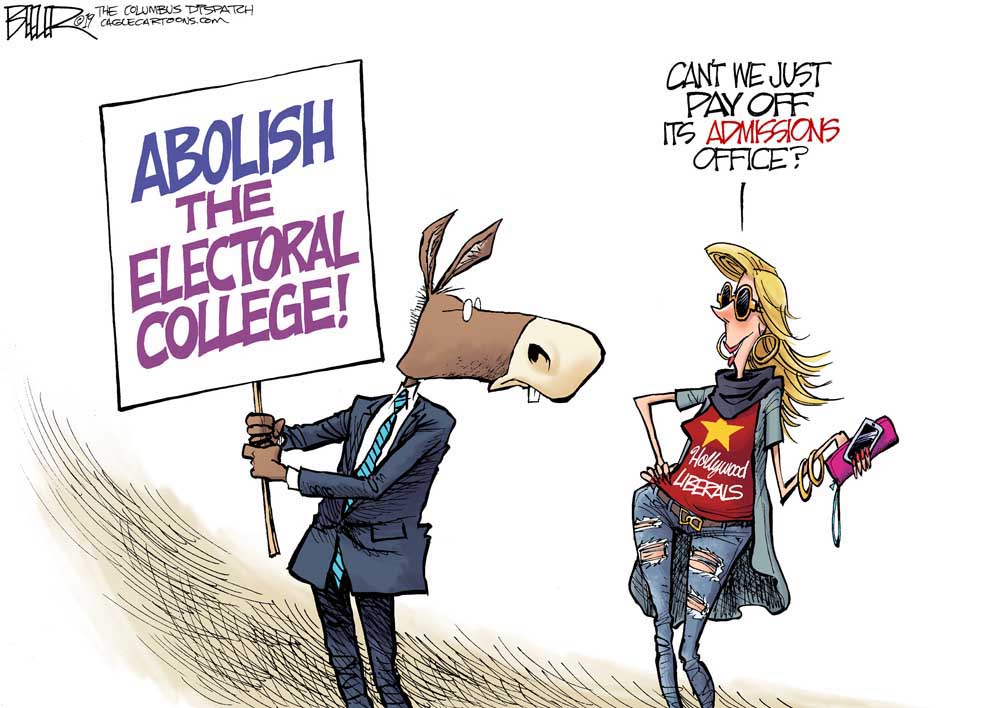Pro/Con | Should Oregon join the effort to abandon the electoral college?
Published 12:00 am Wednesday, May 15, 2019

- Bribe the electoral college
The Oregon Senate passed a bill that would see the state join the National Popular Vote Compact, delegating its electoral votes in the presidential election to the winner of the popular vote rather than the candidate with the most votes in Oregon. The bill has had its first reading in the House and has been referred to the rules committee.
Pro
In our democracy’s infancy, the Founding Fathers came to a compromise when deciding how a president would be elected.
Rather than letting each citizen cast a vote and using the sum total of all those individual votes to decide the next POTUS, each state would be allotted electoral votes based on their population, and those electoral votes would go to most popular candidate — no matter how large the margin — in each state. It was a compromise to satisfy the Southern states, which had far more people than voters because of the vast number of slaves who could have no say in the nation’s laws or leadership. After some negotiation, each of these human beings were determined to be worth 3/5 of a person for the purposes of representation — a reprehensible solution.
Thus the electoral college was born, and to this day remains a mechanism for inequally distributing power.
Not only does it value some voters more than others — a single vote in Wyoming is worth 3.6 in California — but it renders meaningless the individual presidential vote in many states. As Oregonians, for example, a vote for a Republican candidate is an act of futility. Same goes for a Democrat in Texas.
What this leaves is a small handful of “battleground” states whose voters have the luxury of intense focus from the candidates, but the curse of millions of dollars in ad campaigns targeting their votes. If each state’s voters had equal power, candidates would have to spread their attention (and promises) and campaigns would no longer be able to take states for granted or write them off entirely. This would hopefully lead to a more balanced presidency.
It would also shift the balance back to the ideals of democracy — one person, one vote. It’s a bad argument to say certain ideologies should be propped up by the electoral system because they’re not popular enough in urban areas.
Oregon is close to joining the National Popular Vote Compact, which would allocate the state’s electoral votes to the candidate who wins the popular vote. It’s a smart solution, which we’d prefer see go to voters rather than just through the Legislature. But it’s already been adopted by 15 other states, and hopefully that momentum will carry to our remaining partners in the union.
Con
It’s easy to empathize with the argument that the Electoral College is outdated. With two of the five instances in American history where the winner of the popular vote has lost the presidency via the Electoral College occurring in the past 20 years, it’s fresh on our minds. But that’s not to say it hasn’t always been controversial. In fact, in the past 200 years there have been over 700 attempts to amend the Constitution to do away with or alter the Electoral College.
Some might spin this as evidence that it was never sound policy. Though it seems more plausible that 700 failures better evidences the policy’s durability and strength. And while the original rationale behind the Electoral College, controversial as it was, is outdated, only fallacious logic could conclude that it serves no purpose today.
At a time where division and a lack of faith in our political institutions are tearing the fabric of our functional democracy, momentum towards abolishing the Electoral College will only exacerbate this reality. The new rationale for maintaining the Electoral College is that it addresses the inequitable stratification of political power between urban and rural populations.
The ideological gridlock that some have coined the urban/rural divide is defined in terms of economics, racial and ethnic demographics, industry and political ideology. Rural communities, already lagging behind politically and economically would only be further devastated if the Electoral College no longer served as a check on progressive liberalism.
According to the Huffington Post — hardly a conservative propaganda outlet — “if the Electoral College were abandoned and a presidential candidate won every eligible vote in California, she could ignore the least populous 21 states and still have a lead.”
The same source asserts that with 80% of GDP concentrated in cities, rural communities are victimized even further when subject to the cyclical nature of contemporary capitalism. Stripping away rural states and communities of what political capital they have left is a death sentence to the longstanding culture and economic bedrock of this nation. And why? Because one party has twice in 20 years won the popular vote but failed to win the Electoral College. Everyone knew the rules of the game.








